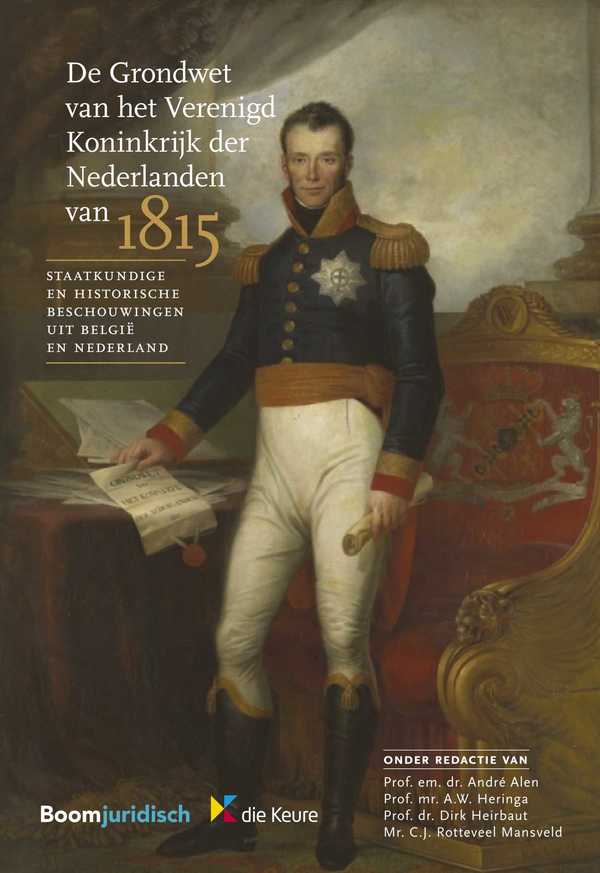(image source: Wikimedia Commons)
In the Fall, two collective books with papers by your humble servant will come out:
1. A. ALEN, D. HEIRBAUT, A. W. HERINGA & M. C. J. ROTTEVEEL MANSVELD (eds.). De Grondwet van het Verenigd Koninkrijk der Nederlanden van 1815. Staatkundige en historische beschouwingen uit België en Nederland. Den Haag/Brugge: Boom Juridische Uitgevers/Die Keure, 2016, 258 p. ISBN 9789462901810, € 49.
My contribution "Bij uitsluiting aan den Souverein, zonder eenige de minste ruggenspraak ?’ Soevereiniteit, grondwet en volkenrecht, van Verenigd Koninkrijk der Nederlanden tot Koninkrijk België" is an analysis of the discussions on the competence for foreign powers within the 1815 constitutional committee. It shelds light on checks on monarchical power, and on the link between Southern ("Belgian") conservative criticism on William I and later, Northern, liberal criticism of the same provision in the 1815 Constitution.
The book contains contributions by renowned experts on constitutional law and political history (A. Alen, A.W. Heringa, F. Stevens, E. Witte, R. Aerts... full list of speakers here) and will be an invaluable addition to any bookshelf.
The work can be pre-ordered for € 49 with Boom Juridische Uitgevers (here).
Update 6 March 2019: this book has been accepted for inclusion in the VABB database.
2. N. DROCOURT & E. SCHNAKENBOURG (dir.). Thémis en diplomatie : l’argument juridique dans les relations internationales de l’antiquité tardive à la fin du XVIIIe siècle [Collection "Histoire", ISSN 1255-2364]. Rennes: Presses universitaires de Rennes, 2016.
My paper "Équilibre et hiérarchie : l’argument juridique dans la diplomatie française et anglaise après la Paix d’Utrecht" (pp. 67-83) is presented as follows:
The Peace Treaties of Utrecht, Rastatt and Baden (1713-1715) marked the end of a century of bloodshed caused by wars among European monarchs. The exceptional period of stability from the War of the Spanish Succession to the War of the Austrian Succession (1740-1748), and the War for Jenkins’ Ear (1739-1748), has not yet received a satisfying overarching interpretation in the historiography. This article argues that part of the answer lies in a legal reading of the available diplomatic sources (I). Historiography of international law has thus far focused mainly on doctrine and published treaties. This contrasts with the importance accorded in present-day international law to States’ practices. Whereas lawyers recognise the importance of state acceptance and norm opposability, legal historians tend to leave this important element to diplomatic history. Yet, legal questions dominated both negotiations on the Spanish Succession (1659-1715) and the implementation of the peace treaties (1713-1740). Late seventeenth- and early eighteenth-century diplomacy thus demonstrates the need for further research on the legal structure of diplomatic argument. Stability in Europe was only achieved through renunciation declarations, entrenched in public international law (II). In the French case, Philip V’s declaration was seen as a violation of loix fondamentales. Britain, on the other hand, needed international support in applying the 1701 Act of Settlement. Consequently, the consistent application of norm hierarchy between treaty law and internal law was the leitmotiv for Franco-British joint efforts to enforce the Utrecht consensus (III), starting with the bilateral Franco-British Alliance (1716), and the Triple (1717) and Quadruple Alliances (1718). The 1720s and 1730s witnessed an erosion of political backing for these policies. Yet, the combination of balance of power and norm hierarchy discourse survived during the War of the Polish Succession (1733-1738).The book contains contributions by A. Becker, A. Beihammer, M. Bélissa, L. Bély, N. Drocourt, E. Fiocchi Malaspina, D. Gaurier, M. Kintzinger, S. Lloret, E. Malamut, F. Micallef, J.-M. Moeglin, E. Nechaeva, S. Péquignot, E. Schnakenbourg, M. Schynder, F. Ternat, F. Toth, M.-C. Vignal-Souleyreau & N. Sallés Vilaseca. It is announced on the Fnac website for € 23.
(update July 2018: Thémis en Diplomatie is now available as an e-book on openedition.org (DOI dx.doi.org/10.4000/books.pur.47665; see here for the page of my paper; free Google Books preview here).
Update 6 March 2019: this book has been accepted for inclusion in the VABB database.





















